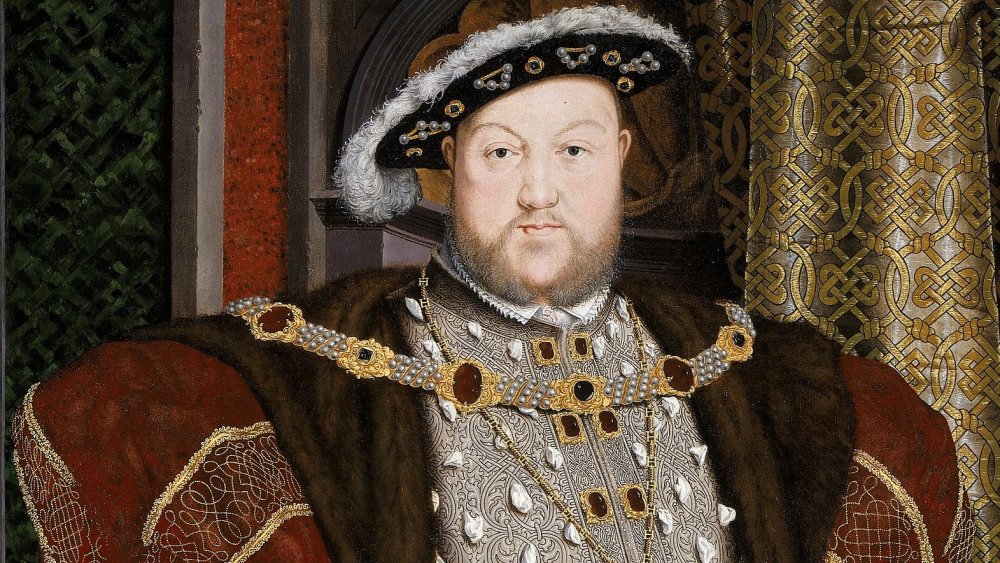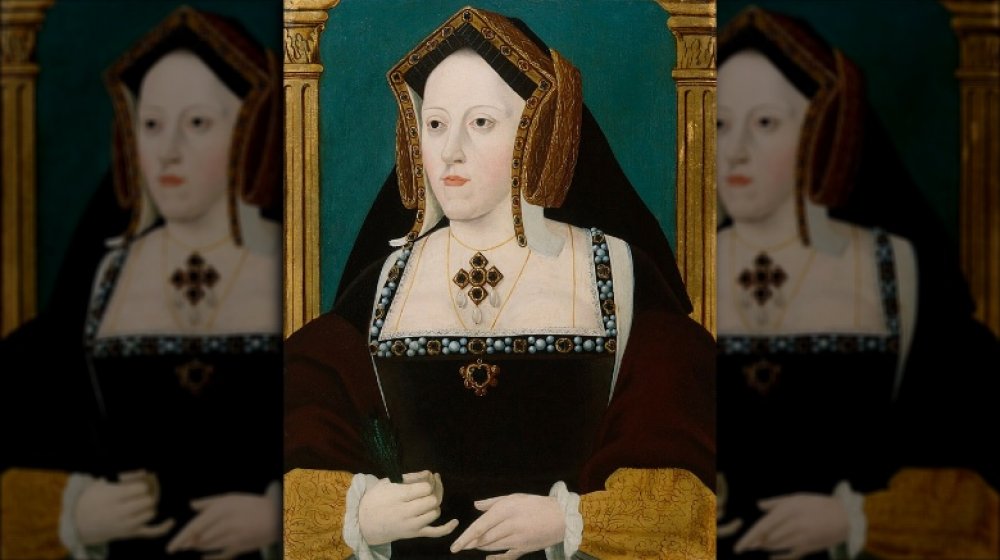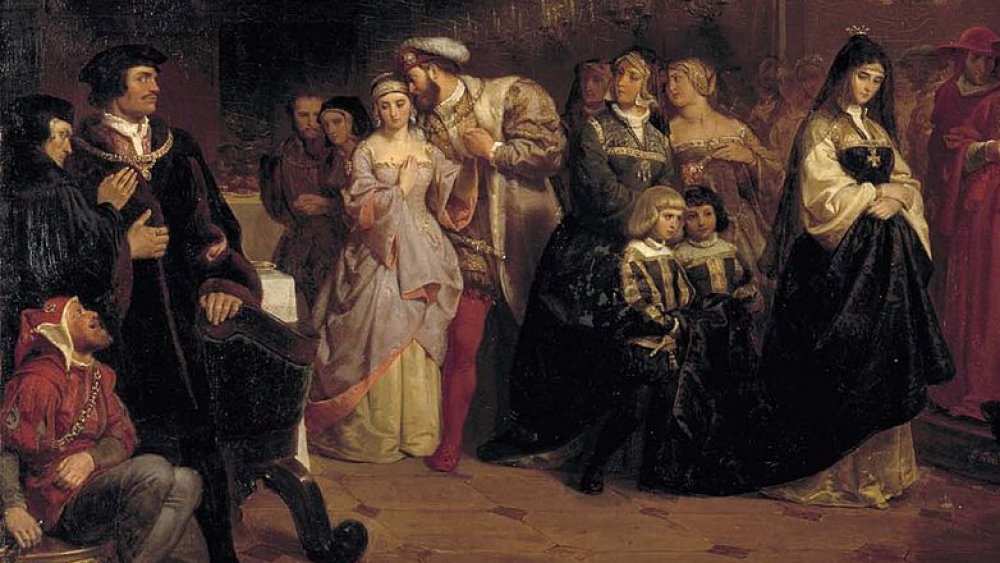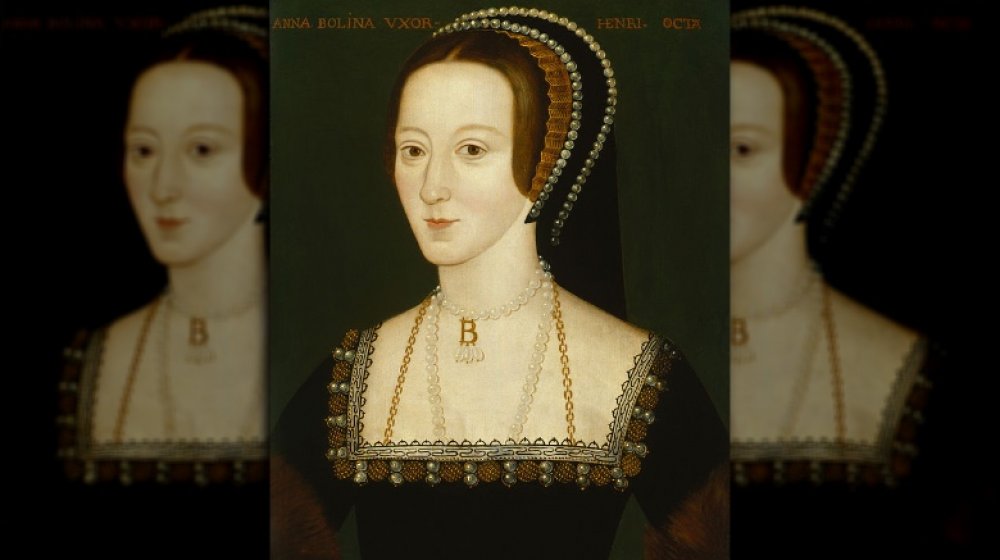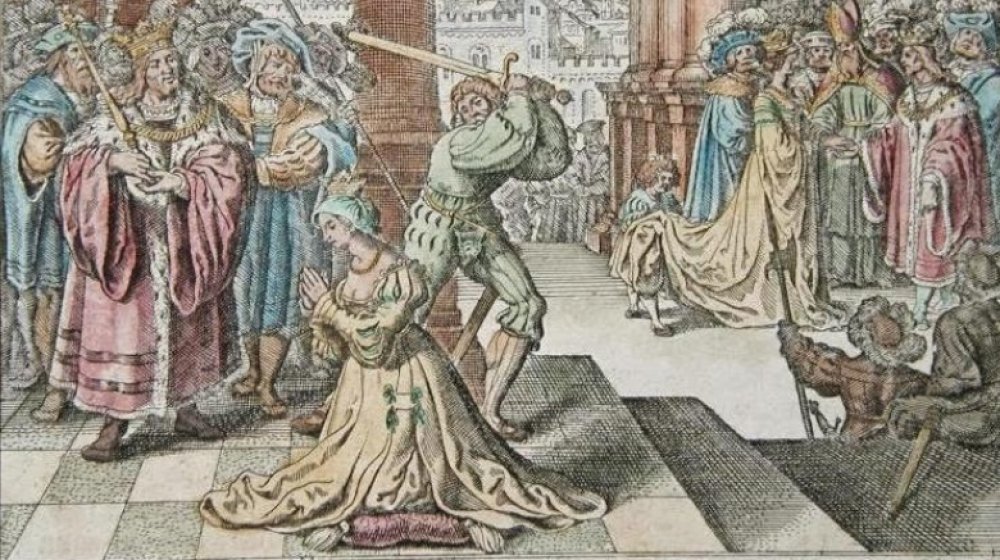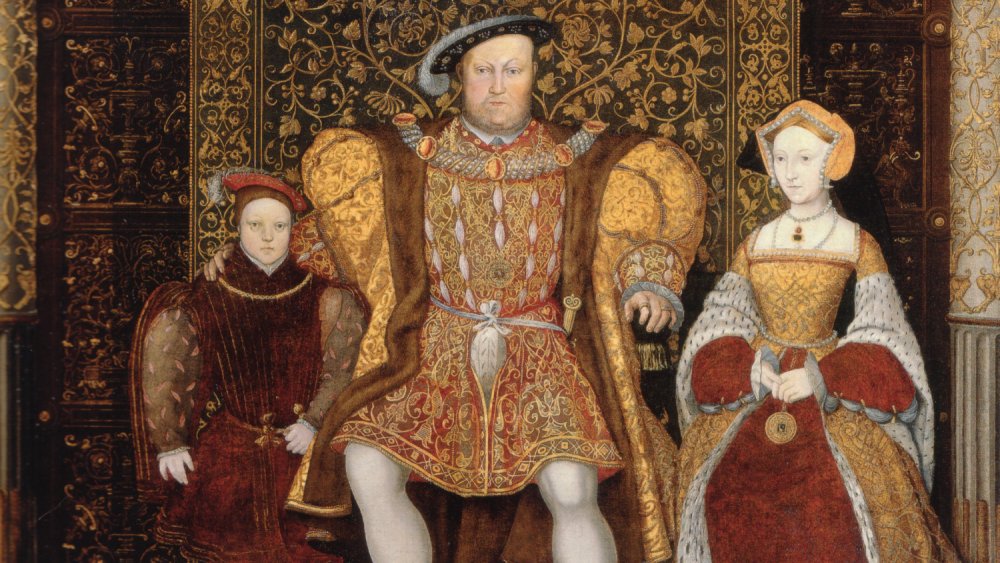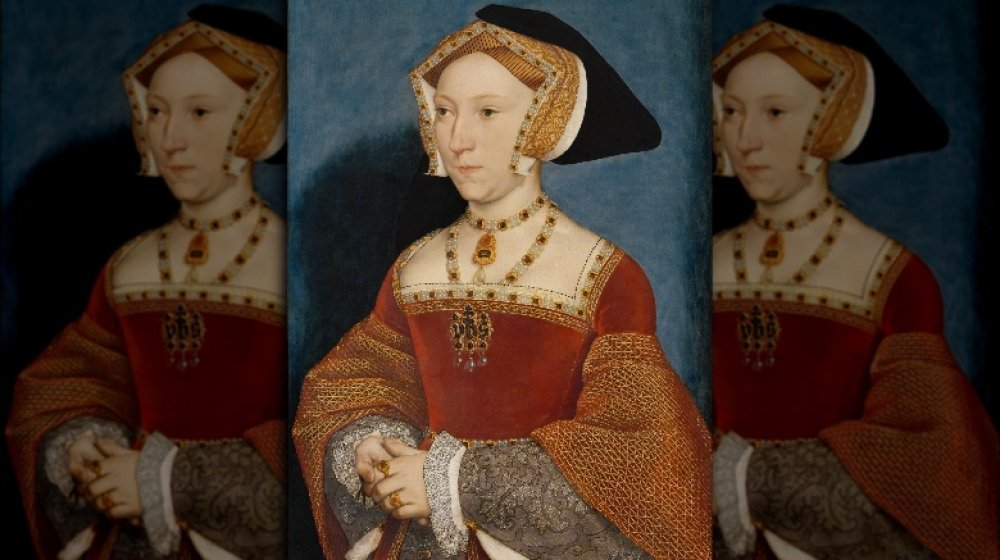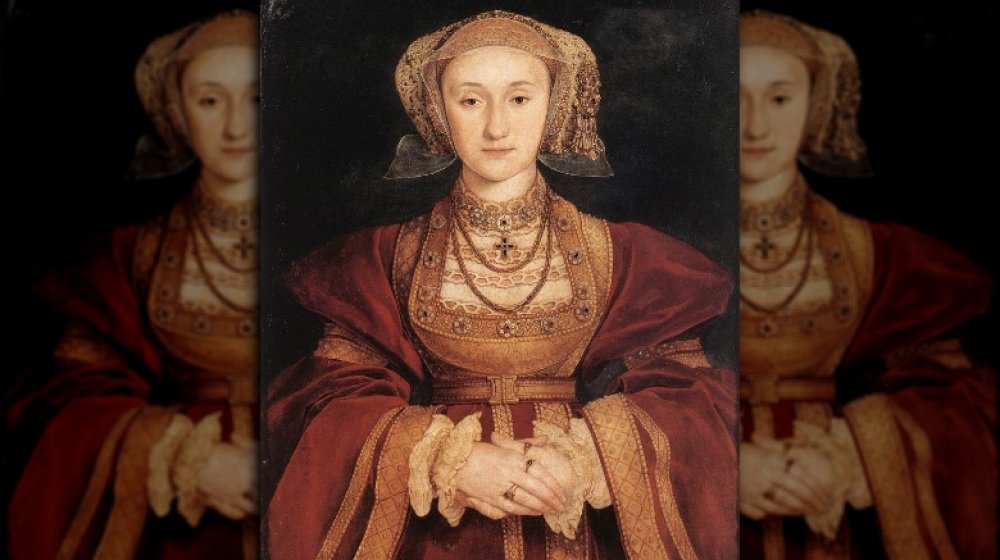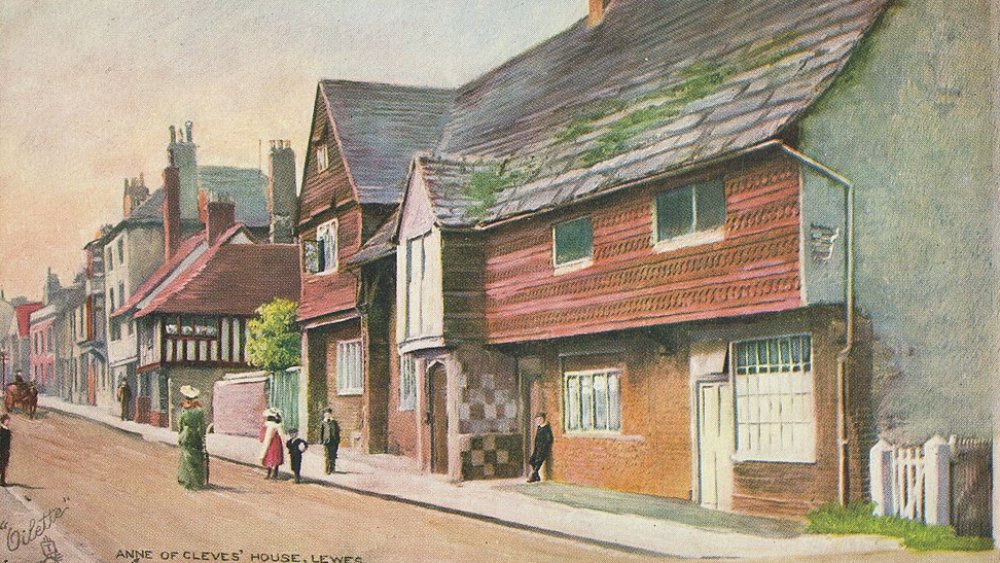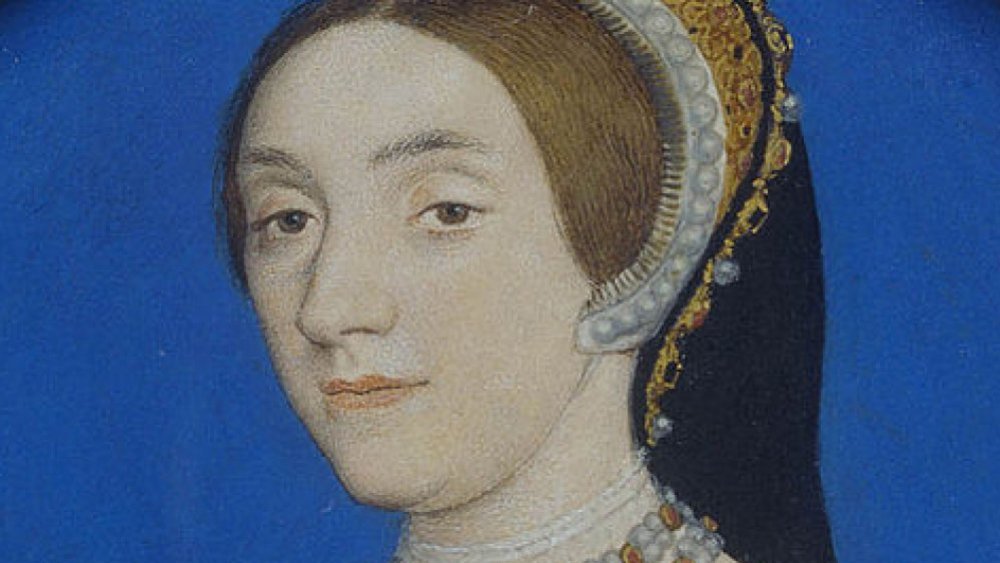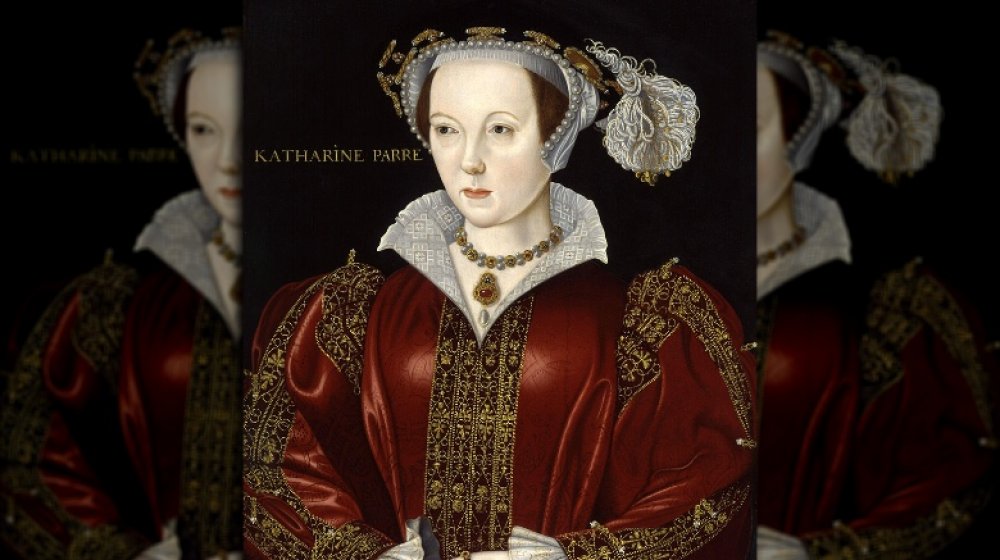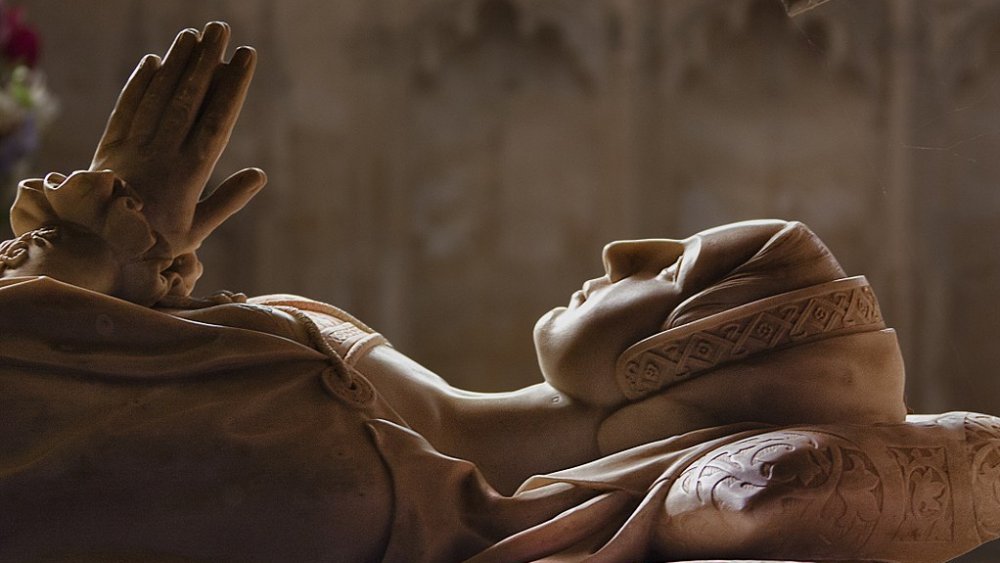The Tragic Truth About Henry VIII's Six Wives
Divorced, beheaded, died, divorced, beheaded, survived. You can use that fun little ditty to remember all six wives of Henry VIII and their respective fates, but don't be tricked into thinking there were any happy endings in that unfortunate little club. Even the wives who got to keep their heads had pretty miserable fates. In those days, marrying the king of England was quite possibly the worst thing that could happen to you, and not just because the dude was a gigantic, smelly, homicidal monster who had the financial sense of a seven-year-old with a credit card and the ethics of a gastrointestinal nematode. Marrying the king was like an extreme sport with a 1:2 chance of death, only not as much fun and a way more disgusting.
So who were the women unlucky enough to be queen of England between the years 1509 and 1547? Well, here's the tragic truth about Henry VIII's six wives.
Henry VIII might've loved Catherine of Aragon ... once
Henry married his brother's widow, Catherine of Aragon, in 1509, not because he had some backward sense of duty to his deceased sibling's wife but because he genuinely loved her. Now, if we look at Henry in his later years, he was clearly a sociopathic tyrant, but he may not have always been that way. There's a lot of evidence that the young king, who was actually lean and handsome at the time, was fully devoted to his bride.
According to Britain Magazine, at first Henry and Catherine were a power couple. She supported him in all of his military endeavors, and in return, he made her regent when he was away from his kingdom. But Catherine had one great and fatal flaw as a wife — she was unable to give Henry a son. Catherine lost at least five children in infancy, and the only one who survived was a girl (Bloody Mary), which wasn't going to fly back in olden times.
As the years dragged on, it became clear that Catherine's childbearing days were over, but the king's Roman Catholic faith also meant that Henry wasn't going to be able to divorce his wife, either. He was trapped, and he increasingly felt like Catherine was the one doing the trapping. He may have loved 23-year-old Catherine when their whole lives were still ahead of them, but he no longer felt the same about 35+, barren Catherine. Love didn't stand a chance next to Henry's fear of dying without a male heir.
Henry VIII banished his first wife
In the 1500s, you couldn't just call up a lawyer and claim irreconcilable differences. The pope was the only person qualified to grant a divorce, so you had to have a very good reason to break your vows. Henry spent years trying to convince the man in Rome that his marriage to Catherine was invalid because she'd once been married to his brother, but the pope wasn't having it. And as the years went by, Henry became more and more resentful until, eventually, he just gave the royal finger to Catherine and the pope and decided to annul the marriage himself as head of the church he invented specifically for the purpose of annulling his own marriage.
Henry didn't have Catherine beheaded. After all, he wasn't quite there yet in his descent from beloved ruler of England to terrifying crazy person. Instead, Bustle says he just banished her and made sure she never saw her only surviving child again. Even so, Catherine was never openly angry, and she even continued to write to him. In her last letter, she declared her continued affection and signed it "Catherine the Queen," which must've really pissed off Anne Boleyn.
Catherine died in 1536 at the age of 50. It would be cheesy to say she died of a broken heart, but according to contemporary reports, her heart was literally black, which could've been indicative of heart cancer. Or maybe poison.
Anne Boleyn might've been more innocent than history lets on
History remembers Anne Boleyn as a manipulative, king-stealing home-wrecker. Author Kyra Cornelius Kramer begs to differ, though. Kramer says the evidence points to a very reluctant Anne Boleyn, who rejected Henry's advances to the point where she actually fled court because she was unable to keep the king at arm's length. What's more, she refused to return even though Henry wrote multiple letters begging her to do so. The king was so narcissistic that he just couldn't imagine why in a million years any woman would be capable of rejecting so much royal manliness, and evidently, historians are right there with him.
None of Anne's letters to Henry survived, but based on the context of Henry's letters to Anne, she seems to have repeatedly told him she wasn't interested in becoming his mistress. Even modern historians seem to have trouble with the idea that Anne actually might have not wanted to become queen, so they assumed that every move she made must've been calculated to drive Henry crazy with affection.
That's probably wrong, though. Anne wasn't the one who put a bug in Henry's ear about divorcing his wife. He'd already been working on that problem long before he became besotted with Anne Boleyn. Hey, historians, do you think maybe Anne just didn't really like Henry very much?
Anne Boleyn's own uncle tried and convicted her
When your uncle shows up at your house drunk on Thanksgiving and says homophobic things in front of your two gay neighbors, that's pretty cringeworthy. Take comfort in the fact that pretty much everyone has an awful uncle, so you're not alone in your pain. If your uncle is especially awful, though, it may be of comfort for you to know that he's nowhere near as bad as Anne Boleyn's uncle who presided over his own niece's trial and pronounced her guilty of history's most made-up crimes. Why? Because Henry was scary. Or politics. Who knows.
According to The Anne Boleyn Files, at Anne's trial, her uncle, the Duke of Norfolk, is the one who announced her conviction on all charges, including adultery, incest, and witchcraft. "Because thou has offended our sovereign the king's grace in committing treason against his person ... thou hast deserved death, and thy judgement is this: That thou shalt be burned here within the Tower of London, on the Green, else to have thy head smitten off, as the King's pleasure shall be further known of the same."
Also on the jury, there was Henry Percy, the Earl of Northumberland, who'd once been engaged to Anne Boleyn and was forced to vote "guilty" because it's not like the trial was ever supposed to be fair or anything.
Why Jane Seymour was Henry VIII's favorite wife
Henry clearly loved Catherine of Aragon, and he probably loved Anne Boleyn, too, though there's an argument to be made that he loved the idea of divorcing his barren wife more than he loved the woman he planned to replace her with. But as Henry grew into a gigantic, smelly, homicidal old man, there was only one woman he looked back upon with fondness, and that was his third wife, Jane Seymour. In fact, according to The Anne Boleyn Files, he was so fond of Jane's memory that he called her his "true love" and his "true wife," and he even had her image painted into the Whitehall family portrait, which probably would've annoyed the woman he was actually married to at the time (Catherine Parr) except for the part where she probably didn't really care about much except keeping her own head at that point.
So why did Jane hold such a special place in the king's heart, when he knew her for less than two years? Well, besides the fact that it usually took Henry a few years to get tired of one of his wives, she was the only one who ever gave him the thing he desperately wanted: a son. So really, it wasn't about Jane at all. He didn't love her for her witty personality, her sense of humor, or how she looked in selfies. Instead, he loved the fact that she had a fully-functioning, male child-producing uterus.
Jane Seymour may not have died from childbed fever
Jane Seymour gave Henry his much-desired son, so he probably would've kept her around for five, maybe 10 more years except that actually giving Henry VIII a son wasn't a guarantee of survival. Really, survival wasn't guaranteed for anyone in the Tudor era, and not just because Henry was forever chopping people's heads off. Instead, that's because it was the 1500s, and doctors didn't wash their hands, food wasn't refrigerated, and the medical care system in general was really, really crappy.
History says Jane Seymour died from puerperal fever, which is a common post-childbirth complication that regularly claimed women's lives in those days because no one back then knew that the black stuff that grows on old bread is actually penicillin. But author Alison Weir thinks that Jane Seymour may have died from something else entirely, partly because there's no mention of a fever in any of the historical records. Instead, Jane had what seems to have been a stomach ailment, followed by a few days of recovery, followed by illness, and then death. Her symptoms seem to align with pulmonary embolism, which is when a blood clot forms somewhere in your body, then breaks free and reaches your heart and lungs, causing death. The fact that Jane was often described as being unnaturally pale suggests she may have suffered from anemia, which can make you more vulnerable to this condition.
Anne of Cleves unwittingly humiliated Henry
Henry's fourth bride — Anne of Cleves — was a departure from his ordinary pattern of marrying his rejected wives' ladies-in-waiting. Henry agreed to marry Anne for political reasons, and probably also because she was the only woman in Europe who was somehow able to look past the whole murdered wife thing. (When offered the position of fourth wife, Christina of Milan reportedly said, "If I had two heads, one should be at the king of England's disposal." That's probably fiction, but it's fun fiction.)
Anyway, Anne of Cleves agreed to marry Henry because maybe as a non-English speaker she got "beheaded" mixed up with "beloved" or something. According to The Anne Boleyn Files, Anne of Cleves was supposed to meet Henry at Greenwich Palace, but first she stopped to rest in Rochester, and then — surprise! — Henry showed up. But here's the twist. He was in disguise, and he sort of just marched into the room, grabbed her, and kissed her without her permission. Well, if Anne had been a modern woman, she would've kneed him in the naughty bits and called the cops, but she wasn't a modern woman so she just tried to pretend he didn't exist. You can guess how that went over with Henry, who for some reason expected his future bride to recognize his royal hotness even though she'd never seen him before. Some historians think this incident is part of what led him to ultimately reject his fourth wife.
Anne of Cleves never remarried
Anne of Cleves may have survived her marriage to Henry VIII, but not without a certain amount of torment. According to The Anne Boleyn Files, Henry had Anne removed from court, and she almost certainly heard the rumors that her husband was back to his old pattern of falling in love with his wife's maids of honor. (This time, it was the unfortunate Catherine Howard). At one point, he sent a messenger to Anne in the middle of the night, which is usually something you do when you plan to have your wife dragged off to the Tower of London. The whole mess finally ended in divorce, which Anne readily agreed to, probably because it was so very much better than losing her head.
Anne could've gone back to Germany, but she didn't, probably for a couple of reasons. It would've been humiliating, but she'd also been offered a nice consolation package. Henry gave his former wife a £4,000 annual salary with three houses (one pictured above), plus jewels and furnishings. Also, she got Hever Castle, which had once been the home of the Boleyn family, but apparently the total creepiness of that particular gift was lost on her. Most importantly, Anne survived. In fact, she outlived the king and all his other wives. She never remarried, though, and she lived a pretty idle life, so she probably didn't die especially pleased about the way things turned out.
Catherine Howard was doomed by a boastful ex-lover
For some reason, Catherine Howard agreed to become Henry VIII's fifth wife with full disclosure about what had happened to the first four. Even if she'd had absolutely nothing sordid in her past, she should've fled under cover of darkness at the very first sign the king was into her. She didn't, though. She married Henry even though she knew what he was like and even though she knew that her own personal history was full of things that arrogant, self-centered Henry might object to. Why? Because she wanted to be queen. Probably. Who knows.
According to History Extra, before she met the king, Catherine likely had relationships with two men — her music teacher and a man named Francis Dereham. She married Henry when she was maybe 16 or 17, and on the advice of her family, she decided not to tell her husband about her romantic history. Catherine did okay as queen until she made the inexplicable decision to become involved with a guy named Thomas Culpeper, who already had a reputation as an assaulter of women and was possibly a murderer. Their relationship was probably platonic, but the fact that it was a relationship at all was kind of the first nail in Catherine's coffin. The thing that finally did her in, though, was the arrival of Francis Dereham, who started bragging about how he'd once had an affair with the future queen. Now that was a stupid man.
Catherine Howard practiced her own execution
For all of her other faults, Catherine Howard was smart enough to understand that people who were accused of treason in Henry VIII's England were pretty much always convicted of treason. So when those accusations started coming her way, she made one attempt to appeal to her husband's sense of pity, but she was dragged back to her room before she could make it as far as the chapel where he was praying. By the time she was notified of her execution date, though, she seemed resigned to the fact that she was going to die.
"On Sunday the 12th, towards the evening, she was told to prepare for death, for she was to die next day," wrote Imperial ambassador Eustace Chapuys. "That evening she asked to have the block brought in to her, that she might know how to place herself; which was done, and she made trial of it." Catherine Howard was queen for just over a year, so keep in mind that she was probably still a child at the time she was in the Tower of London practicing her own execution.
Henry VIII's final wife was nearly executed
Henry's sixth and final wife married him because ... no one really has any idea why anyone would marry Henry VIII at that point in history. He was morbidly overweight, which by itself doesn't exclude a person from deserving happiness, but he was also a wife-killer, a murderer in general, a narcissist, and he had open sores on his legs that festered and stank. Also, he was bad at budgeting. Despite being king of England, the dude was really not much of a catch, even if you could get away from the wife-killing part of the equation.
Still, there was one woman remaining in the world who was willing to give Henry a chance — Catherine Parr, Henry's sixth and final wife and third and final Catherine. Parr was 30 years old when she met Henry, which made her practically elderly. She was twice a widow, and according to Hampton Court Palace, she probably married the king because she thought it was God's will. Clearly, God didn't like her very much.
Catherine Parr survived her marriage to Henry VIII, but it was touch and go at one point. Her enemies tried to convince the king that she was plotting against him, and there were even plans to arrest her. But Catherine was able to do what her predecessor hadn't. She begged for Henry's mercy and was pardoned for whatever made-up crimes she was about to be accused of.
At last, a happy ending ... just kidding
Catherine Parr outlived Henry VIII, who probably died from renal and liver failure, although there weren't exactly coroners in those days, so no one can really say for sure. He weighed more than 300 pounds, though, which isn't something that tends to be compatible with a long life.
At that point, Catherine had been widowed three times, she'd officially survived five years of marriage to the most tyrannical king in England's history, and she deserved a little happiness. A few months after the king's death, she married Thomas Seymour, who'd been her sweetheart before she met the king. (Evidently, that history never came up with Henry, or maybe at that point, the king was just tired of worrying about his wives' past relationships.)
Anyway, Catherine lived happily ever after. Actually no, she didn't. Shortly after she married Tomas Seymour, she became pregnant, and then gave birth to a healthy baby girl. She died shortly afterwards of puerperal fever, proving that nobody had a happy life back in the 16th century.
